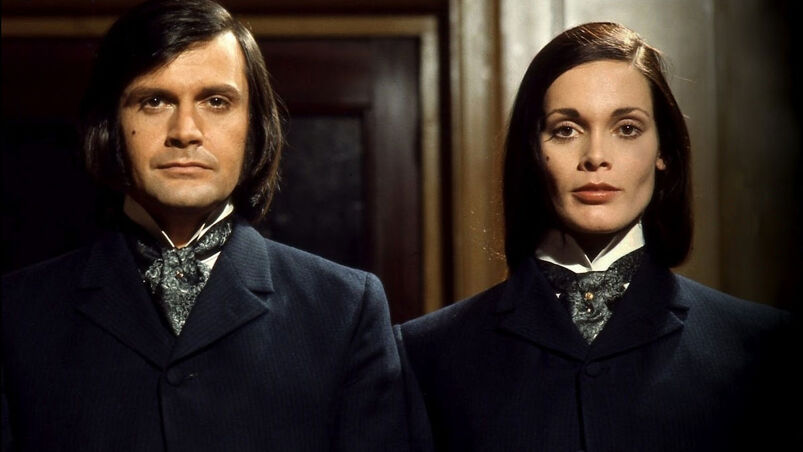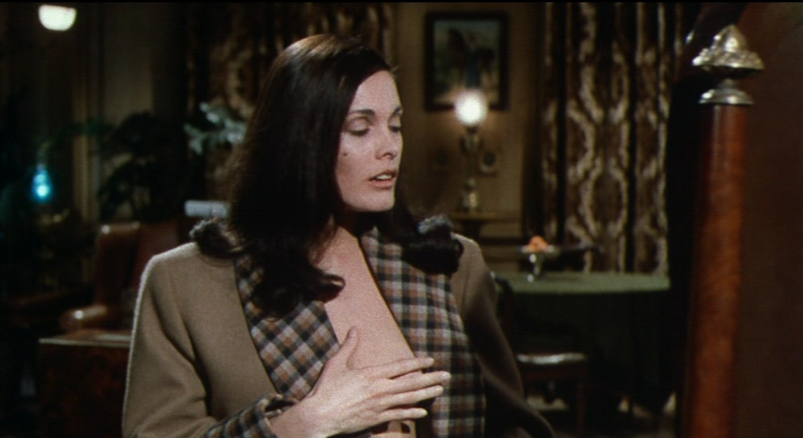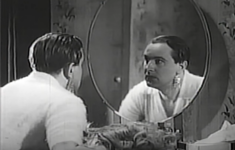
Welcome back to our queer film retrospective, “A Gay Old Time.” In this week’s column, we revisit 1971’s British body horror romp, Dr. Jekyll And Sister Hyde.
At the beginning of the month, we discussed in this column how horror movie villains have historically been stand-ins for outcasts and the figure of the ‘Other,” and why the queer community tends to gravitate towards these stories and characters—even if the movie itself, the devil-as-a-gay-boy horror flick Fear No Evil was less than successful in its attempt.
Horror, with its many portrayals of lonely creatures, underdog final girls, and celebration of the untraditional, has always been a rich place for us to find metaphors.
This week, we’ll talk about another movie that reflects themes and issues that resonate with us. However, unlike last time, this film actually seems to have a point of view and purpose in tackling these subjects, and makes for a worthy, entertaining watch. This week it’s not Lucifer taking over a teenager, but a doctor taking an elixir that transforms him into something much more complex and fascinating than a regular old monster: the opposite gender.
The Set-Up
Dr. Jekyll And Sister Hyde, as the playful title indicates, is a spin on the classic tale by Robert Louis Stevenson, in which a scientist takes a potion that transforms him into a different being, who then slowly succumbs murderous tinges and tries to take over his body and identity.
Traditionally, the being is a monstrous, deformed, terrifying creature that wreaks havoc into Victorian London; a much more direct metaphor for an outcast. But in this riff on the classic tale, the creature is a seductive, bloodthirsty female that goes on a killing rampage to survive.
The 1971 British film directed by Roy Ward Baker follows Doctor Henry Jekyll (Ralph Bates), a scientist whose sole goal is to cure all human illnesses, but who is haunted by the lack of time he has to accomplish this as a mere mortal. Thus, he begins a search for the elixir of life that will make him immortal.
Using female pheromones from murdered corpses he got from a morgue, Dr. Jekyll devises a potion that not only extends the life to whoever takes it, but also changes their gender into female (since they live longer and have stronger systems, naturally).
Dr. Jekyll takes the potion himself, and is transformed into a beautiful woman (played by Martine Beswick). The family that lives above him, particularly the young and innocent daughter Susan (Susan Brodrick) become suspicious about his whereabouts and experiments, and Dr. Jekyll has to pretend that his alter ego is actually his sister, Edwina Hyde.
Both Dr. Jekyll and Sister Hyde soon realize that in order to keep the effects of the potion, they need more female pheromones. A battle for the body then ensues, where Edwina goes on a killing rampage across London to keep herself alive and take over the life and body of Dr. Jekyll permanently.
Bodies Bodies Bodies
It doesn’t take much to notice the rich themes around gender, body, and identity that the movie tackles with surprising ease, and the ways they directly resonate with the queer community. The central tension revolves around a literal conflict between the male and female facets of a person fighting over bodily autonomy and control.
It could even be said that, at points, Dr. Jekyll feels more comfortable and in power as Edwina—she’s certainly having much more fun.
The movie very cleverly plays with and subverts gender conventions of both the time it was made (the 1970s) and its setting (in Victorian-era London). Even though his status in society goes down a peg, we are never led to believe that Dr. Jekyll feels less when he is Edwina; on the other hand, he seems to have much more power and agency. He suddenly becomes an object of lust, desire, and misogyny, and uses it to his advantage.
Transformations

The film also brings to mind much deeper issues of gender identity that could have resonance for trans viewers. It is, after all, about a man transforming into a woman and finding the power that it gives him.
However, it’s still stuck in a time and place where language and understanding was very basic (if not nonexistent) around these issues, so in this regard it plays in the “horror as queer metaphor” realm rather than doing any sort of meaningful grappling with dysphoria or identity (unlike Glen Or Glenda, which directly addresses these issues).
Related:
Before sci-fi & sexploitation, this infamous director explored the mysteries of his own queerness
Once considered one of the worst films of all time, Ed Wood’s ‘Glen Or Glenda’ has a fascinating legacy.
It’s A Scream!
But beyond the relevance that the movie has for queer audiences, it’s just a plain fun time. It’s more a farce or dark comedy than a straight horror film, evoking the films of Vincent Price or Roger Corman in style and tone: low-budget films that were clearly made in a sound stage with recycled period outfits, buckets of bright red blood, and actors performing to the back of the theater.
They’re not aiming to be artful masterpieces, but pulp narratives with a catchy plotline, a couple of gruesome killings and gory effects, and maybe a flash or two of boobs. Sometimes, that’s all a movie needs.
Dr. Jekyll And Sister Hyde is an unexpectedly fun, and perhaps unintentionally thoughtful entry into the canon of horror films that reflect the queer experience. It takes a familiar story and embeds it with a fresh perspective that actually has something to say about its characters, time period, and genre.
It’s a small, rickety movie with shoddy production value, somewhat clunky acting, and predictable beats, but one that still manages to feel fresh. It offers what queer people do best, particularly around Halloween: taking something that feels familiar, and reconstructing it with our own sense of identity.
Dr Jekyll And Sister Hyde is now streaming on Amazon Freevee, Peacock, The Roku Channel, ShoutTV, and Tubi.
Related:
‘Freddy’s Revenge’, and 10 other screamingly sexy queer Halloween horror films
Each flick feature a healthy element of homoeroticism, sometimes overt, sometimes subtle, but always sexy & dangerous.





















Doug
I love this film! There’s another version called “Doctor Jekyll” which just opened in the UK yesterday starring Eddie Izzard as Nina Jekyll.
dbmcvey
A truly terrible, incredibly enjoyable movie!
Pietro D
Sounds perfectly horrible, in the worst sense of the word.
A DEFINITE PASS ON THIS RUBBISH! It’s 1970’s flick and
you impose too many 2023 values to it making it even less
attractive as a “genre” film.